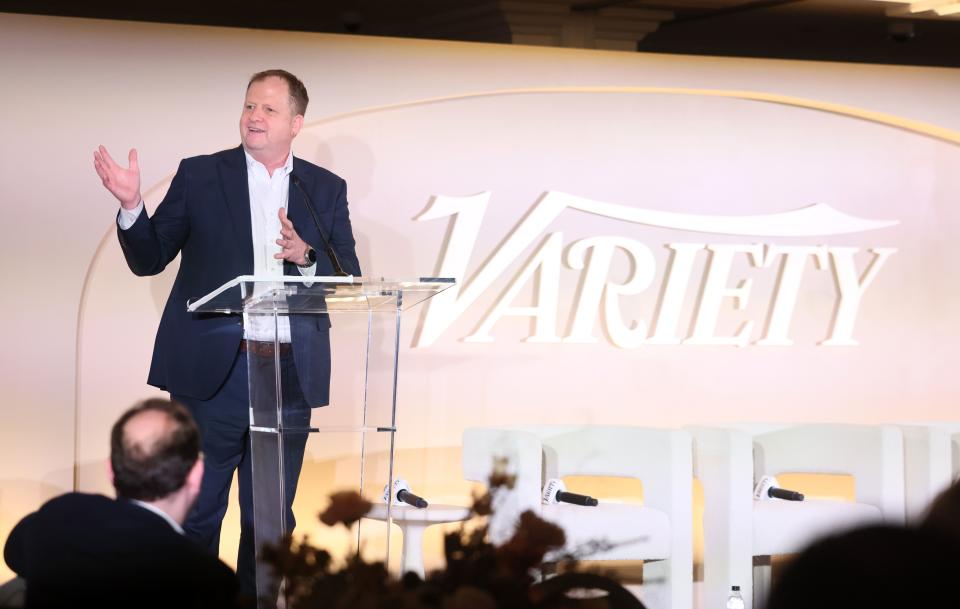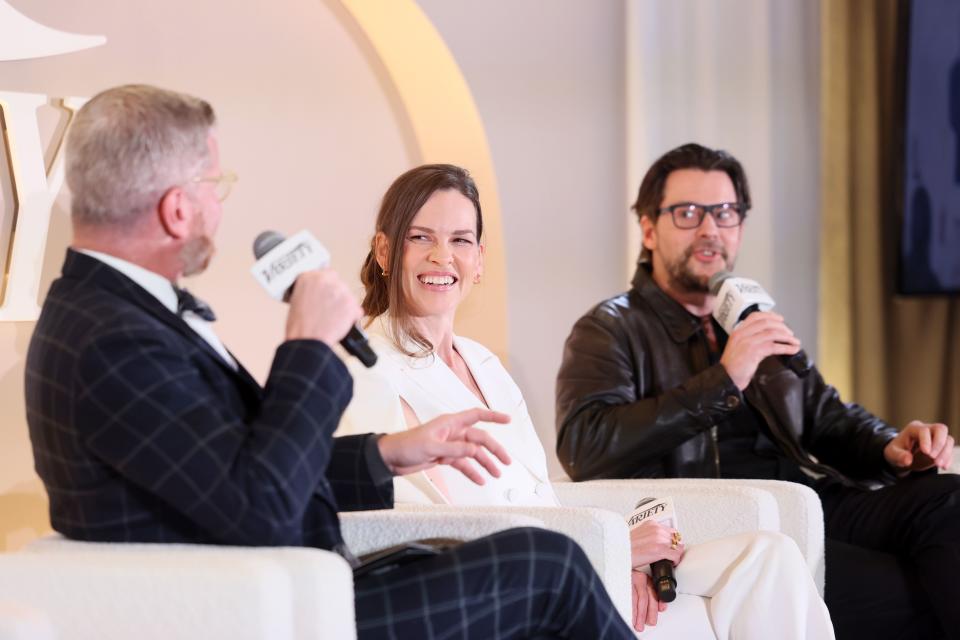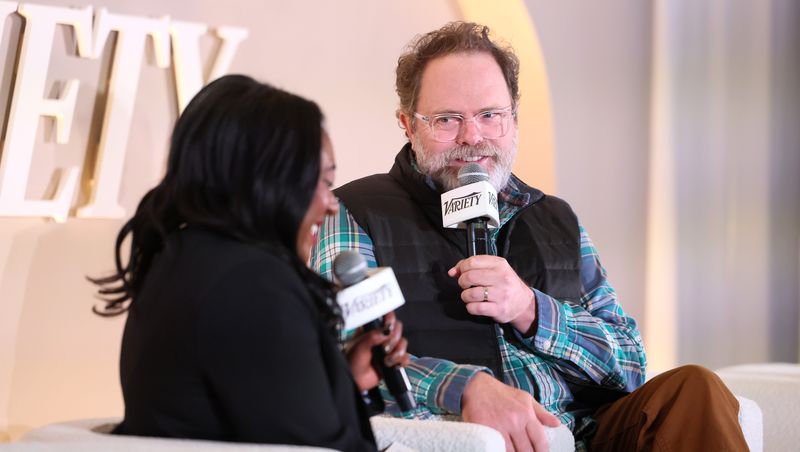LOS ANGELES — Viewers in the U.S. and across the globe want to see more accurate and diverse portrayals of faith and religion in television and movies, according to a new global study that looked at faith in the entertainment industry.
The Global Faith and Entertainment Study, conducted by HarrisX in partnership with the Faith & Media Initiative, revealed that more than half of viewers across the world believe the industry perpetuates stereotypes about religion, sensationalizing religious identity and often resorting to inaccurate tropes and tired storylines. And 80% of viewers would like to see an improvement in how stories about faith are told: They’d welcome fresh and diverse narratives when it comes to depictions of faith.
“I believe and I know that we are spiritual beings having a human experience,” said Rainn Wilson, an actor, producer and author of “Soul Boom: Why We Need a Spiritual Revolution.” “So why does the storytelling oftentimes not reflect this reality?”
Wilson was among leaders in the entertainment industry who spoke today at the “Spirituality and Faith in Entertainment” breakfast at The London hotel. The event was hosted by Variety and presented by the Faith & Media Initiative, a nonprofit dedicated to ensuring more accurate and balanced representation of all faiths in entertainment and news, and which is part of Deseret Management Corporation.
Participants reflected on the need for more accurate and diverse faith-infused storylines and the growing openness within the industry toward spiritually inclusive content.


“The growth of this market cannot be denied,” said Cynthia Littleton, the co-editor-in-chief at Variety. “The evolution of the content has been significant in the last few years as the content business has been on steroids, and I think everybody in this room knows the market is wide and the demand is vast.”
With the rise of depression and anxiety, especially among young Americans, many people have been turning to spirituality to alleviate their anxiety and find meaning, Wilson said. “There are people that have a great hunger for elevated spiritual conversations — inspiring, unifying conversations that are for all people of all faiths to find wisdom and work together to make the world a better place,” said Wilson, who is a member of the Baha’i faith and starred in the hit show “The Office.”
“Whether you’re making a feature film or a limited series, a TV show or working in digital media, there’s a lot of potential there to not only garner a large audience, but a potential to make a serious impact for the positive in the world,” Wilson said.
But faith and spirituality narratives get flattened in entertainment, the study found. Often, the portrayal of religion surrounds characters who are either victims or villains, said Jeff Simpson, president and CEO of Deseret Management Corp., which is the parent company of Deseret News.
“The human tendency for negative bias makes it more potent to lean into those spaces,” Simpson said. “But there is much more color and beauty to them.”
Why viewers want more faith in films and TV
The study, released today, built on a previous Faith & Media Initiative study that examined faith in news and the media.
Conducted in the summer of 2023, the entertainment study surveyed nearly 10,000 consumers across 11 countries who answered questions via an online survey. The study also included 30 interviews with directors, producers, actors and writers from seven countries, including Spain, Mexico, Honduras and Nigeria.
Dritan Nesho, CEO of HarrisX, highlighted why the findings are important. “People feel that they are underrepresented in the content, and when they are represented, they feel that more often than not, they’re misrepresented rather than adequately represented,” Nesho said. And this group is not in the minority: Nearly 73% of entertainment consumers around the world are people who are spiritual or faithful, he said, adding, “There is large swath of the global entertainment consumer that yearns for this kind of content. What they yearn for is better representation, more accuracy in the storytelling and the character development, and actually more diversity.”
Related
The study found that among various aspects of an individual’s identity — gender, orientation, sex, race and ethnicity — religion is the least represented, and when it is represented, it’s portrayed in a sensationalized way, Nesho said.
And ensuring that this portrayal is accurate is important because, even more than news outlets, viewers see entertainment as one of the ways they can learn about another faith, Nesho said. Nearly 60% of study participants reported learning something new about a religion from a movie or TV show, and they believe that TV and movies can foster dialogue between people of different beliefs.
Why it’s hard to get faith right in TV and movies
In interviews conducted throughout the study, industry experts noted that creating narratives that feature faith and spirituality requires caution.
“We’re afraid of getting it wrong, and we don’t quite have a playbook to getting it right,” Nesho said. “And the hard thing about hard things and new things is that more often than not, there isn’t a playbook.”
Wilson also pointed to various marketing considerations that industry executives have to juggle. “My experience is (that) television executives and development executives are really good people that do want to make the world a better place, but they’re kind of up against a wall because they need viewers and they need clicks and they need downloads and they need sponsors and they need advertisers and they need to build audience share,” said Wilson, who is a co-founder of SoulPancake, a media company that explores life’s big questions.
The inherent complexity of telling stories about faith and religion can be intimidating, similar to the challenge of telling stories about war, politics and sexuality, said Brooke Zaugg, executive director of the Faith & Media Initiative. “We don’t shy away from those things,” she said. “We tackle [those topics] in a thoughtful, meaningful way. There is no reason why we should not be faith-fluent and capable of tackling this equally complex and important topic.”
Related
Zaugg pointed to the 2016 film “Hacksaw Ridge” that told the story of a religious combat medic during World War II. “I thought that was a tremendous example of unpacking a complex part of that particular Christian faith’s belief and his decision of how he would show up in the world,” she said. Likewise, she mentioned the forthcoming film “Cabrini,” a story of an Italian-American Catholic nun, who advocated to establish housing and health care for orphaned children.
Also at the event, Hilary Swank, a two-time Academy Award-winning actress, spoke about her upcoming film “Ordinary Angels,” which is based on a true story and tells the story of a woman who struggles with alcoholism and loss of faith, then finds healing. “The power of church and community and how community comes together to help one another is depicted in this film in a very beautiful way,” Swank said.


Roma Downey, the Emmy-nominated actor and producer who starred in the CBS series “Touched By an Angel” and co-produced “The Bible” miniseries, pointed to the need for more uplifting and hopeful television. She stars in “The Baxters,” a family drama based on the best-selling novels by Karen Kingsbury, that will be out in March on Amazon Prime. Downey likes to call the series a “hope-opera,” she said. “There are people looking for stories of hope,” she said.
How stories of faith are pitched matters, too, said DeVon Franklin, CEO of Franklin Entertainment and producer of “Flamin’ Hot” and “Miracles from Heaven.” He recalled pitching “Breakthrough,” his 2019 film about a child who comes back to life after drowning after his mother prays, and how persuasive his excitement proved to be. “You gotta be enthusiastic and not just opportunistic,” he said. “Don’t hide your faith, but also talk about how it can be universal as well.”
Franklin endorsed a bolder approach of appealing to the core audience of believers. “We gotta take more ownership,” he said. “It’s OK to say we are making it a Christian film with Christian values, and each of us is gonna have a different way of doing that, and that is OK, but let us not be afraid of what makes us distinctive when we are making content that looks like that.”
How Hollywood can produce more shows about faith
While shows like “The Chosen” have proven popular, there is an untapped market for films that have thought-provoking, diverse and accurate portrayals of characters’ faith and spirituality, according to Zaugg of the Faith & Media Initiative. Elevating examples of commercially successful stories that weave in faith and spirituality organically with other threads is important, Zaugg said. “That’s how I think we’ll find success,” she said.
The study identified three ways the entertainment industry can improve the way it tells stories about faith: hiring experts who drive narrative development to ensure accurate portrayal of faith, writing more diverse characters and including creators who share the religion of theses characters.
Expanding the definition of how we see faith in entertainment can be a helpful way forward, said Franklin, of Franklin Entertainment. “I think when you look at the power of faith, people only look at it sometimes through a religious lens,” he said.
Franklin considers “Star Wars” to be the most significant faith-based movie. “Why? Because you have to believe in the power you can not see. The force is faith,” he said, adding that it’s important to widen the aperture on how faith is depicted. “I think the goal is to continue to expand what it means to be a movie that deals with spirituality and faith.”




